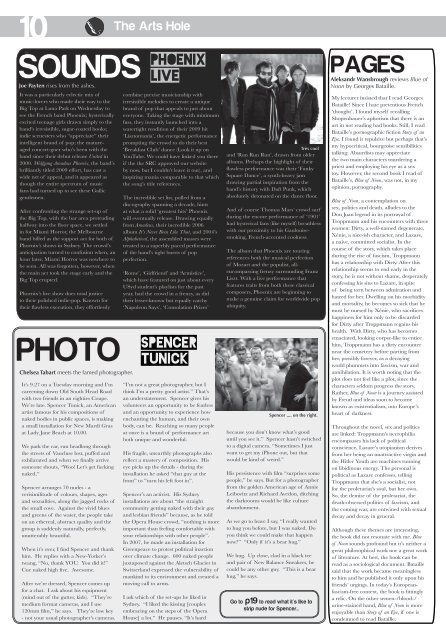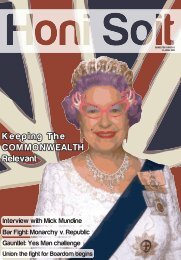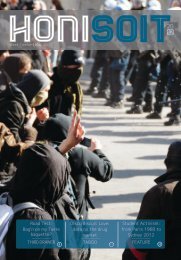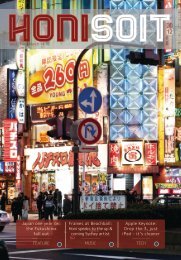Confessions of a BAD Vegetarian - Students Representative Council ...
Confessions of a BAD Vegetarian - Students Representative Council ...
Confessions of a BAD Vegetarian - Students Representative Council ...
You also want an ePaper? Increase the reach of your titles
YUMPU automatically turns print PDFs into web optimized ePapers that Google loves.
10<br />
SOUNDS<br />
w<br />
Joe Payten rises from the ashes.<br />
It was a particularly eclectic mix <strong>of</strong><br />
music-lovers who made their way to the<br />
Big Top at Luna Park on Wednesday to<br />
see the French band Phoenix; hysterically<br />
excited teenage girls drawn simply to the<br />
band’s irresistible, sugar-coated hooks;<br />
indie scenesters who “appreciate” their<br />
intelligent brand <strong>of</strong> pop; the matureaged<br />
concert-goer who’s been with the<br />
band since their debut release United in<br />
2000. Wolfgang Amadeus Phoenix, the band’s<br />
brilliantly titled 2009 effort, has cast a<br />
wide net <strong>of</strong> appeal, and it appeared as<br />
though the entire spectrum <strong>of</strong> music<br />
fans had turned up to see these Gallic<br />
gentlemen.<br />
After confronting the strange set-up <strong>of</strong><br />
the Big Top, with the bar area protruding<br />
halfway into the floor space, we settled<br />
in for Miami Horror, the Melbourne<br />
band billed as the support act for both <strong>of</strong><br />
Phoenix’s shows in Sydney. The crowd’s<br />
anticipation turned to confusion when, an<br />
hour later, Miami Horror was nowhere to<br />
be seen. All was forgotten, however, when<br />
the main act took the stage early and the<br />
Big Top erupted.<br />
Phoenix’s live show does total justice<br />
to their polished indie-pop. Known for<br />
their flawless execution, they effortlessly<br />
The Arts Hole<br />
PHOENIX<br />
PAGES<br />
LIVE Aleksandr Wansbrough reviews Blue <strong>of</strong><br />
Noon by Georges Bataille.<br />
combine precise musicianship with<br />
irresistible melodies to create a unique<br />
brand <strong>of</strong> pop that appeals to just about<br />
everyone. Taking the stage with minimum<br />
fuss, they instantly launched into a<br />
watertight rendition <strong>of</strong> their 2009 hit<br />
‘Lisztomania’, the energetic performance<br />
prompting the crowd to do their best<br />
‘Breakfast Club’ dance (Look it up on<br />
YouTube. We could have linked you there<br />
if the the SRC approved our website<br />
by now, but I couldn’t leave it out), and<br />
inspiring mania comparable to that which<br />
the song’s title references.<br />
The incredible set list, pulled from a<br />
discography spanning a decade, hints<br />
at what a solid ‘greatest hits’ Phoenix<br />
will eventually release. Drawing equally<br />
from Amadeus, their incredible 2006<br />
album It’s Never Been Like That, and 2004’s<br />
Alphabetical, the assembled masses were<br />
treated to a superbly paced performance<br />
<strong>of</strong> the band’s tight bursts <strong>of</strong> pop<br />
perfection.<br />
‘Rome’, ‘Girlfriend’ and ‘Armistice’,<br />
which have featured on just about every<br />
USyd student’s playlists for the past<br />
year, had the crowd in a frenzy, as did<br />
their lesser-known but equally catchy<br />
‘Napoleon Says’, ‘Consolation Prizes’<br />
PHOTO SPENCER<br />
Chelsea Tabart meets the famed photographer.<br />
It’s 9.27 on a Tuesday morning and I’m<br />
careening down Old South Head Road<br />
with two friends in an eighties Coupe.<br />
We’re late. Spencer Tunick, an American<br />
artist famous for his compositions <strong>of</strong><br />
naked bodies in public spaces, is making<br />
a small installation for New Mardi Gras<br />
at Lady Jane Beach at 10.00.<br />
We park the car, run headlong through<br />
the streets <strong>of</strong> Vaucluse lost, puffed and<br />
exhilarated and when we finally arrive<br />
someone shouts, “Woo! Let’s get fucking<br />
naked.”<br />
Spencer arranges 70 nudes - a<br />
verisimilitude <strong>of</strong> colours, shapes, ages<br />
and sexualities, along the jagged rocks <strong>of</strong><br />
the small cove. Against the vivid blues<br />
and greens <strong>of</strong> the water, the people take<br />
on an ethereal, abstract quality and the<br />
group is suddenly naturally, perfectly,<br />
unutterably beautiful.<br />
When it’s over, I find Spencer and thank<br />
him. He replies with a New-Yorker’s<br />
twang, “No, thank YOU. You did it!”<br />
Cue naked high five. Awesome.<br />
After we’re dressed, Spencer comes up<br />
for a chat. I ask about his equipment<br />
(mind out <strong>of</strong> the gutter, kids). “They’re<br />
medium format cameras, and I use<br />
120mm film,” he says. They’re low key<br />
- not your usual photographer’s cameras.<br />
TUNICK<br />
“I’m not a great photographer, but I<br />
think I’m a pretty good artist.” That’s<br />
an understatement. Spencer gives his<br />
volunteers an opportunity to be fearless<br />
and an opportunity to experience how<br />
enchanting the human, and their own<br />
body, can be. Reaching so many people<br />
at once is a brand <strong>of</strong> performance art<br />
both unique and wonderful.<br />
His fragile, unearthly photographs also<br />
reflect a mastery <strong>of</strong> composition. His<br />
eye picks up the details - during the<br />
installation he asked “that guy at the<br />
front” to “turn his left foot in”.<br />
Spencer’s an activist. His Sydney<br />
installations are about “the straight<br />
community getting naked with their gay<br />
and lesbian friends” because, as he told<br />
the Opera House crowd, “nothing is more<br />
important than feeling comfortable with<br />
your relationships with other people”.<br />
In 2007, he made an installation for<br />
Greenpeace to protest political inaction<br />
over climate change. 600 naked people<br />
juxtaposed against the Aletsch Glacier in<br />
Switzerland expressed the vulnerability <strong>of</strong><br />
mankind to its environment and created a<br />
moving call to arms.<br />
I ask which <strong>of</strong> the set-ups he liked in<br />
Sydney. “I liked the kissing [couples<br />
embracing on the steps <strong>of</strong> the Opera<br />
House] a lot.” He pauses. “It’s hard<br />
Très cool<br />
and ‘Run Run Run’, drawn from older<br />
albums. Perhaps the highlight <strong>of</strong> their<br />
flawless performance was their ‘Funky<br />
Square Dance’, a synth-heavy jam<br />
drawing partial inspiration from the<br />
band’s history with Daft Punk, which<br />
absolutely detonated on the dance floor.<br />
And <strong>of</strong> course Thomas Mars’ crowd surf<br />
during the encore performance <strong>of</strong> ‘1901’<br />
had hysterical fans (like myself) breathless<br />
with our proximity to his Gaulouisesmoking,<br />
French-accented coolness.<br />
The album that Phoenix are touring<br />
references both the musical perfection<br />
<strong>of</strong> Mozart and the populist, allencompassing<br />
frenzy surrounding Franz<br />
Liszt. With a live performance that<br />
features traits from both these classical<br />
composers, Phoenix are beginning to<br />
make a genuine claim for worldwide pop<br />
ubiquity.<br />
Spencer .... on the right.<br />
because you don’t know what’s good<br />
until you see it.” Spencer hasn’t switched<br />
to a digital camera. “Sometimes I just<br />
want to get my iPhone out, but that<br />
would be kind <strong>of</strong> weird.”<br />
His persistence with film “surprises some<br />
people,” he says. But for a photographer<br />
from the golden American age <strong>of</strong> Annie<br />
Leibovitz and Richard Avedon, ditching<br />
the darkrooms would be like culture<br />
abandonment.<br />
As we go to leave I say, “I really wanted<br />
to hug you before, but I was naked. Do<br />
you think we could make that happen<br />
now?” “Only if it’s a bear hug.”<br />
We hug. Up close, clad in a black tee<br />
and pair <strong>of</strong> New Balance Sneakers, he<br />
could be any other guy. “This is a bear<br />
hug,” he says.<br />
Go to p19 to read what it's like to<br />
strip nude for Spencer...<br />
My lecturer insisted that I read Georges<br />
Bataille! Since I hate pretentious French<br />
‘thought’, I found myself recalling<br />
Shopenhauer’s aphorism that there is an<br />
art in not reading bad books. Still, I read<br />
Bataille’s pornographic fiction Story <strong>of</strong> an<br />
Eye. I found it repulsive but perhaps that’s<br />
my hypocritical, bourgeoise sensibilities<br />
talking; Absurdists may appreciate<br />
the two main characters murdering a<br />
priest and employing his eye as a sex<br />
toy. However, the second book I read <strong>of</strong><br />
Bataille’s, Blue <strong>of</strong> Noon, was not, in my<br />
opinion, pornography.<br />
Blue <strong>of</strong> Noon, a contemplation on<br />
sex, politics and death, alludes to the<br />
Don Juan legend in its portrayal <strong>of</strong><br />
Troppmann and his encounters with three<br />
women: Dirty, a well-named degenerate,<br />
Xénie, a nice-ish character, and Lazare,<br />
a naive, committed socialist. In the<br />
course <strong>of</strong> the story, which takes place<br />
during the rise <strong>of</strong> fascism, Troppmann<br />
has a relationship with Dirty. After this<br />
relationship seems to end early in the<br />
story, he is not without shame, desperately<br />
confessing his sins to Lazare, in spite<br />
<strong>of</strong> being torn between admiration and<br />
hatred for her. Dwelling on his morbidity<br />
and mortality, he becomes so sick that he<br />
must be nursed by Xénie, who sacrifices<br />
happiness for him only to be discarded<br />
for Dirty after Troppmann regains his<br />
health. With Dirty, who has becomes<br />
emaciated, looking corpse-like to entice<br />
him, Troppmann has a dirty encounter<br />
near the cemetery before parting from<br />
her, possibly forever, as a decaying<br />
world plummets into fascism, war and<br />
annihilation. It is worth noting that the<br />
plot does not feel like a plot, since the<br />
characters seldom progress the story.<br />
Rather, Blue <strong>of</strong> Noon is a journey assisted<br />
by Freud and ideas soon to become<br />
known as existentialism, into Europe’s<br />
heart <strong>of</strong> darkness.<br />
Throughout the novel, sex and politics<br />
are linked: Troppmann’s necrophilia<br />
encompasses his lack <strong>of</strong> political<br />
conscience, Lazare’s utopianism derives<br />
from her being an unattractive virgin and<br />
the Hitler Youth are machines running<br />
on libidinous energy. The personal is<br />
political as Lazare confesses, telling<br />
Troppmann that she’s a socialist, not<br />
for the proletariat’s soul, but her own.<br />
So, the demise <strong>of</strong> the proletariat, the<br />
death-obsessed politics <strong>of</strong> fascism, and<br />
the coming war, are entwined with sexual<br />
decay and decay in general.<br />
Although these themes are interesting,<br />
the book did not resonate with me. Blue<br />
<strong>of</strong> Noon sounds pr<strong>of</strong>ound but it’s neither a<br />
great philosophical work nor a great work<br />
<strong>of</strong> literature. At best, the book can be<br />
read as a sociological document. Bataille<br />
said that the work became meaningless<br />
to him and he published it only upon his<br />
friends’ urgings. In today’s Europeanfascism-free<br />
context, the book is fittingly<br />
a relic. On the other semen-/blood-/<br />
urine-stained hand, Blue <strong>of</strong> Noon is more<br />
enjoyable than Story <strong>of</strong> an Eye, if one is<br />
condemned to read Bataille.






